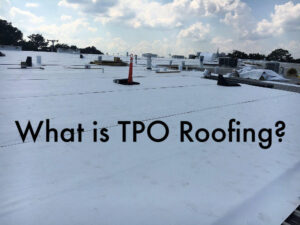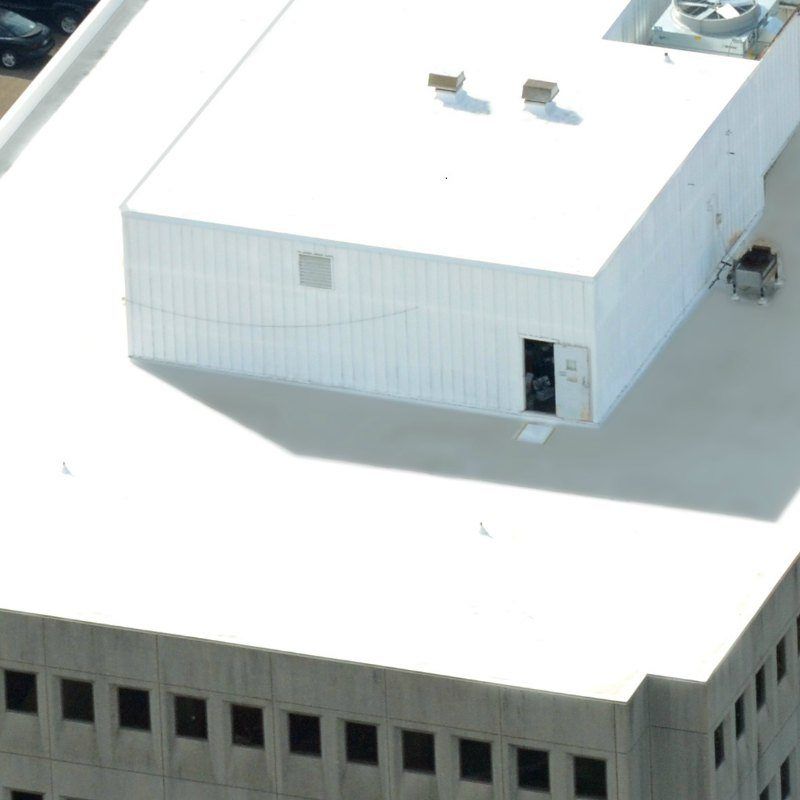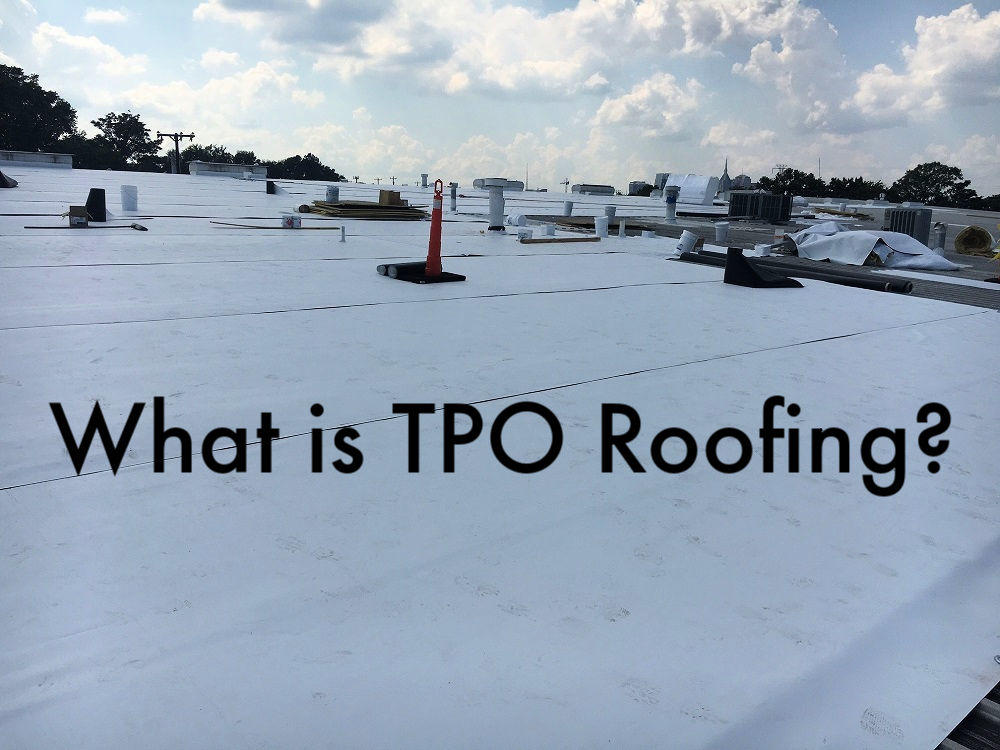
In commercial roofing you often hear the phase TPO used.
But what does TPO stand for in roofing?
TPO is short for thermoplastic polyolefin. TPO is a versatile product used in commercial roofing. A flat TPO roof can be applied in areas that require durability even in low temperatures, provides excellent UV reflection and is chemical resistant. Carlise Syntec is one of the leading manufacturers of top quality TPO roofing systems.
Nashville TPO Roofing Experts!
MidSouth Construction is a commercial roofing contractor certified to install all types of low slope roofing products. Installing a TPO roof is one of our most common commercial roofing projects. Many commercial property owners prefer the affordability and ease of application of a new white TPO membrane roofing system over the older EPDM or BUR commercial roof systems.
WHAT COLOR IS TPO ROOFING?
Typically we think of white when we refer to a commercial roofing system with TPO roofing. But TPO roofing today comes in a range of colors that will fit a wide variety of commercial building themes and needs.
Carlisle Syntec makes the Sure-Weld TPO roofing in various colors including the traditional white, gray, and tan. But the Carlisle Sure-Weld TPO also comes in Rock Brown, Slate Gray, Terra Cotta, Patina Green, and even Mansard Brown! What does TPO Stand for in Roofing? An affordable, durable flat roofing material in a wide range of color options!
How Much Does TPO Roofing Cost?
How Long Does TPO Roofing Last?
TPO roofing, also known as Thermoplastic Olefin roofing, is a roofing membrane that offers durability and longevity. If properly installed, TPO roofing can last for approximately 25 years. However, it’s important to note that this lifespan can vary depending on several factors.
One crucial factor that affects the lifespan of TPO roofing is the weather conditions in your area. Extreme temperatures, strong winds, heavy rain, and prolonged exposure to harsh elements can potentially shorten the life of the roofing membrane. Areas with frequent temperature fluctuations or high UV radiation may also impact the overall durability of the TPO roof.
Proper Installation of TPO is Critcal
The amount of direct sunlight that the TPO roofing receives also plays a role in its longevity. Continuous exposure to intense sunlight can result in increased wear and tear, leading to a shorter lifespan. Similarly, the quality of installation is crucial for maximizing the potential lifespan of TPO roofing. Improper installation techniques can compromise the integrity of the roofing membrane, reducing its durability and lifespan.
Although the standard estimate for TPO roofing longevity is 25 years, it’s important to note that this is not a guarantee. To ensure that your TPO roofing reaches its maximum life expectancy, it is essential to have it professionally installed and regularly maintained. Adequate maintenance, including regular inspections and repairs when necessary, can help extend the lifespan of TPO roofing and help it achieve its maximum durability.
Why Do You Need TPO Roofing?
TPO roofing is necessary for roofs with a low slope or flat surface. Unlike roofs with a steeper pitch, low slope roofs do not allow water to run off as quickly, making them prone to damage from standing water. Traditional asphalt shingles are not suitable for these types of roofs as they are not designed to withstand prolonged exposure to water.
In fact, building codes and shingle manufacturers’ installation instructions explicitly state that asphalt shingles should not be used on roofs with a pitch lower than 2:12. This regulation exists to ensure that roofs are properly waterproofed and protected against potential leaks and water damage.
Building Code Requirements
To meet these requirements, a TPO roofing membrane is recommended for low slope or flat roofs. TPO, or thermoplastic polyolefin, is a durable and waterproof material that effectively prevents water penetration and safeguards the underlying structure from moisture-related issues.
It is crucial to engage a reputable roofing contractor who understands these specifications. If a roofing contractor suggests installing shingles on a low slope roof, it is advisable not to proceed with their services. The installation of TPO roofing, or another flat roof system, is essential to ensure the long-term integrity and performance of your low slope or flat roof.
What are the BEST Roofing Materials for a Flat Roof?
When faced with the task of selecting optimal roofing materials for a flat roof, it becomes imperative to consider various factors critical to enduring performance. The unique requirements of flat roofs, such as effective water pooling resistance and prolonged protection against the elements, demand careful consideration.
To guide you in making an informed decision, our blog post, “What Is The Best Material for Flat Roofs?” delves into the intricacies of the seven material options commonly employed in commercial flat roofing within the Nashville area.
This comprehensive blog explores the characteristics of each material, outlining their benefits, durability, and cost implications. We believe that the insights shared will empower you to make well-informed purchasing decisions, considering both the quality and affordability of the diverse flat roofing materials available.
What Are Some Alterantives For TPO Roofing on a Flat Roof?
Some alternatives to TPO roofs for flat roofs include EPDM (synthetic rubber material) and polyvinyl chloride (PVC). EPDM is known for its cost-effectiveness in terms of materials, although its standard black color may affect its energy efficiency. In contrast, PVC offers superior chemical and fire resistance compared to TPO, but TPO excels in tear strength and break strength.
What Factors Influence the Cost of r TPO Roofing System?
The cost of a TPO roofing system is determined by several key factors. These factors include the type of attachment system chosen, such as ballasted, fastened, or attached roofs. Additionally, the cost can also be influenced by the thickness of the TPO product that is selected. Typically, the cost of the attachment system for TPO roofing can range anywhere from $1.50 to $2.70 per square foot, depending on these factors.
How Much Does A Square of TPO Roofing Cost?
A square of TPO Roofing typically costs $150 to $270 per square and varies based on key factors like materials and type of attachment.
What Are The Cons to Selecting a TPO Roofing System?
When selecting TPO roofing, it is important to be aware of several factors that can impact your decision. Firstly, there can be significant variations in material quality among different TPO manufacturers. This disparity can affect the pricing, durability, and longevity of the roofing system. To ensure you choose the best TPO product for your building, budget, and needs, it is advisable to seek guidance from commercial roofing experts who can provide insights into the reputable manufacturers in the market.
TPO Roofing and Optimal Performance
Additionally, the installation of TPO roofing requires specific conditions for optimal performance. It is crucial to install TPO roofing in dry conditions since the process of welding the seams involves heat adhesion. Working in damp or wet conditions can compromise the integrity of the seams and the overall effectiveness of the roofing system. Therefore, planning the installation during a period of dry weather is essential to achieve a secure and long-lasting TPO roof.
Moreover, while TPO roofing can be a suitable choice for flat roofs, it may not be the best option for roofs with a high pitch. In such cases, alternative roofing materials or systems might offer better performance and longevity, taking into account the specific requirements and challenges posed by high-pitched roofs. Understanding these considerations and potential drawbacks of TPO roofing can help you make an informed decision and ensure the success of your roofing project.
What are the PROS to Installing a TPO Roof?
When considering different options for flat roofing materials such as TPO, EPDM, or PVC, there are several key benefits to choosing a TPO roof. First, TPO roofs are known for their durability, offering resistance to various elements and potential damages. This durability makes them popular for commercial buildings with flat roofs. Additionally, TPO roofs are affordable while still providing quality and durability.
The ease of installation is another advantage, as TPO roofs come in wide sheets, reducing the number of seams and, therefore, lessening the installation time and effort. Furthermore, TPO roofs offer flexibility in terms of insulation options, allowing you to choose the type that best suits your needs. Energy efficiency is another significant benefit of TPO roofs, as they can help reduce utility bills and decrease your carbon footprint.
TPO roofs are also low maintenance compared to some other roofing options, offering savings in upkeep costs over the long run. Lastly, TPO roofs are eco-friendly, as they are recyclable at the end of their lifespan, reducing environmental impact.
Is TPO An Environmentally Friendly Product?
TPO roofs are recognized as eco-friendly due to their ability to lower air conditioning costs in warm weather. However, their environmental benefits extend beyond energy efficiency. One significant ecological advantage of TPO roofs is that they are recyclable at the end of their useful lifespan. By being recyclable, TPO roofs can be transformed into new materials, lessening the strain on landfills and cutting down on the environmental toll of producing entirely new products.
Recognized As Nashville’s Leading Commercial Roofing Contractor
As Nashville’s top-rated Commercial Roofers, MidSouth Construction extends a helping hand by offering complimentary commercial roof inspections and consultations. Our goal is to assist you in identifying the optimal solution tailored to your specific commercial flat roofing needs. Remember, the best material for your flat roof is the one that aligns seamlessly with your unique requirements and budget considerations.
EXPERT TPO COMMERCIAL ROOFERS!
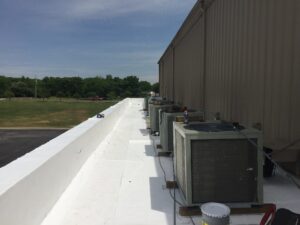
What does TPO stand for in roofing?
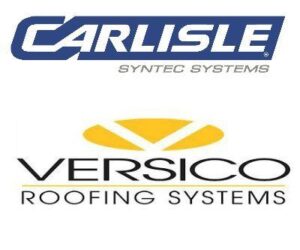
Commercial Roofing Contractor certified with Carlisle Roofing Systems and Versico Roofing Systems. Commercial Roofing
Quite simply, one of the absolute BEST commercial roofing solutions on the market today! MidSouth Construction is certified with all major TPO commercial roofing system manufacturers including Carlisle Syntec, Sika Saranfil, GAF, Versico, GenFlex, and MuleHide! We would love the opportunity to earn your business!

